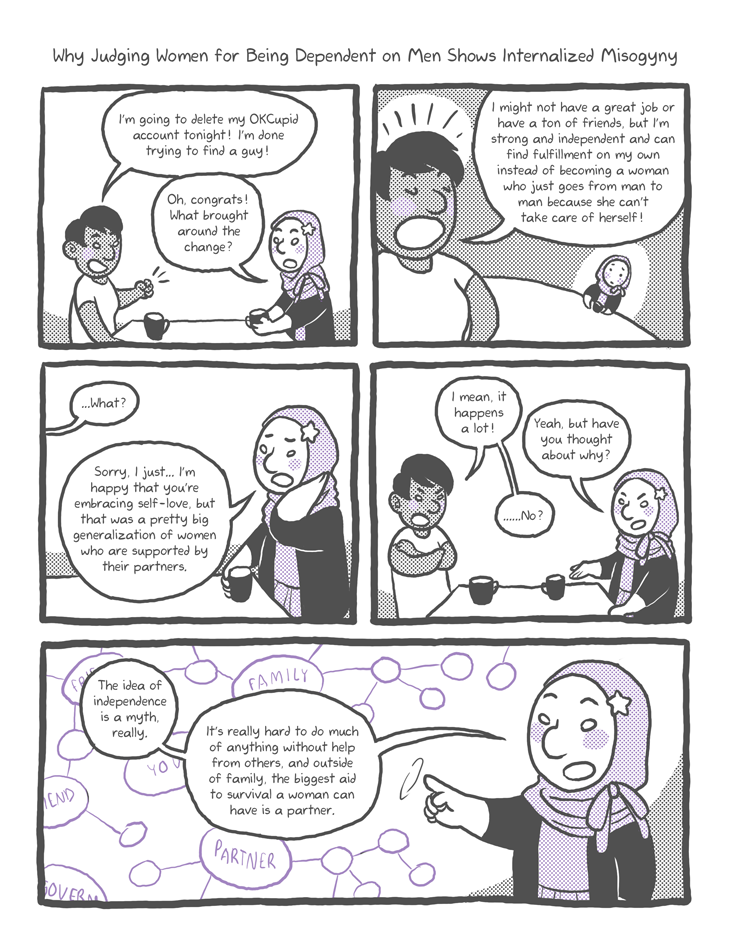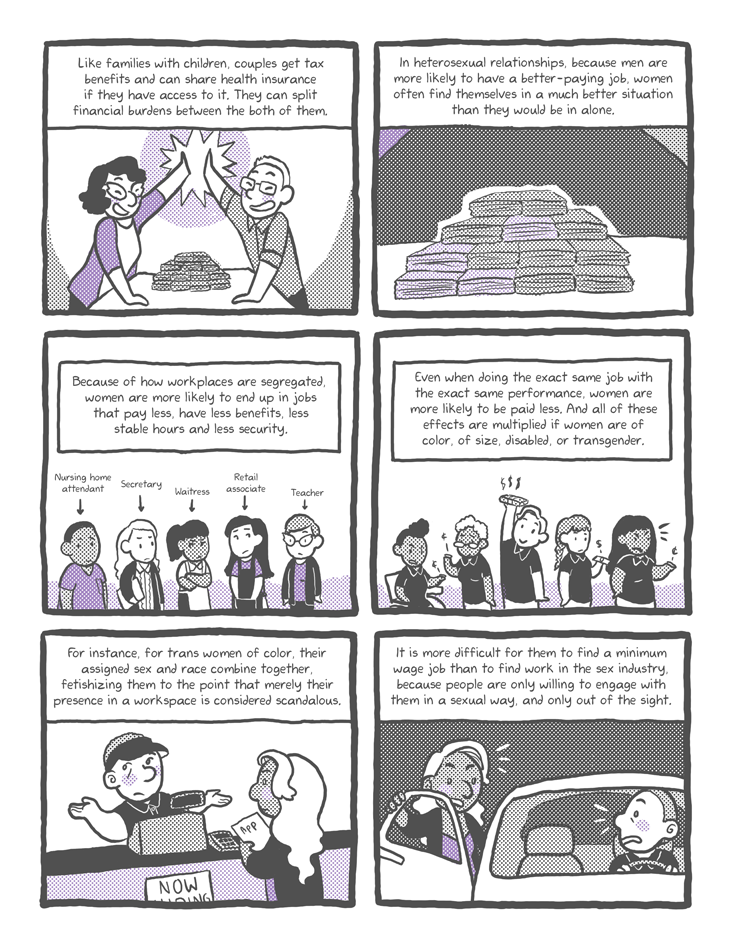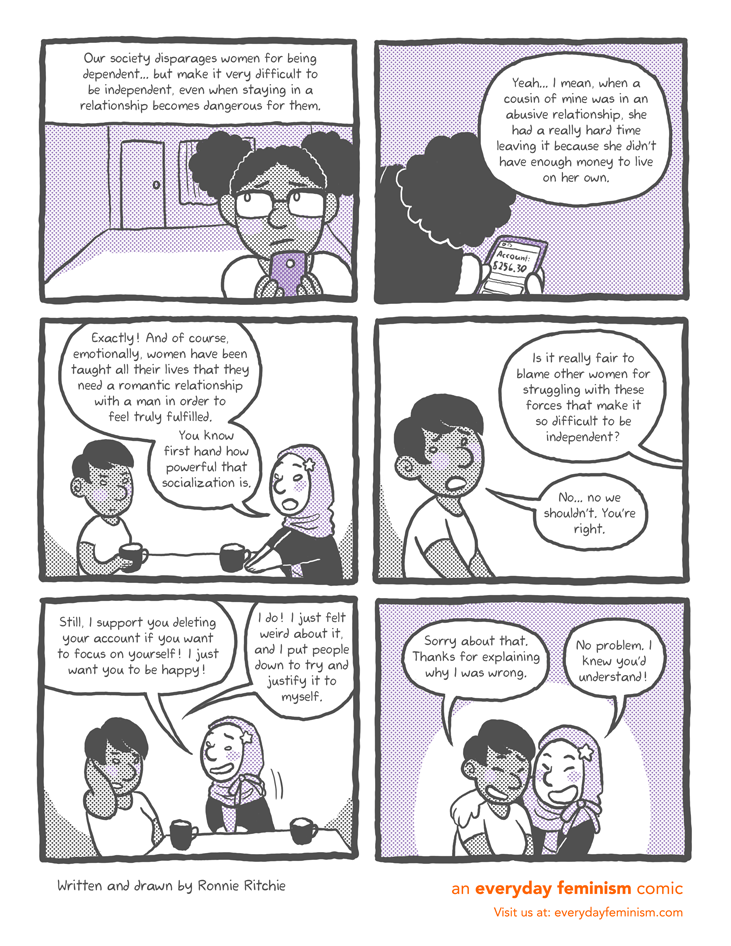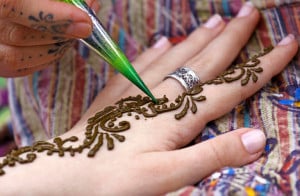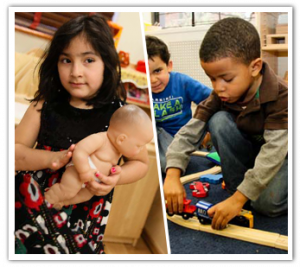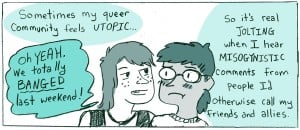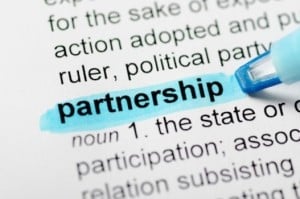Panel 1
Friend A: (puffs chest out proudly) I’m going to delete my OKCupid account tonight! I’m done trying to find a guy!
Friend B: (smiles, delighted) Oh, congrats! What brought around the change?
Panel 2
Friend A: (continues proudly, humble bragging) I might not have a great job or have a ton of friends, but I’m strong and independent and can find fulfillment on my own instead of becoming a woman who just goes from man to man because she can’t take care of herself!
Friend B: (pauses awkwardly)
Panel 3
Friend A: (notices her friend’s expression) What?
Friend B: (shyly) Sorry, I just… I’m happy that you’re embracing self-love, but that was a pretty big generalization of women who are supported by their partners.
Panel 4
Friend A: (defensively) I mean, it happens a lot!
Friend B: Yeah, but have you thought about why?
Friend A: (more uncertain) …No?
Panel 5
(Friend B stands in front of a background of multiple threads connecting to each other like a web.*)
Friend B: The idea of independence is a myth, really. It’s really hard to do much of anything without help from others, and outside of family, the biggest aid to survival a woman can have is a partner.
(*connections can be labeled things like “family,” “farm subsidies,” “child tax benefit,” etc.)
Panel 6
(A couple stands facing each other, holding between both of them a pile of money. The money is color-coded between each of the two people. The amount of money the same color as the woman is less than the money the same color as the man.)
Friend B: Like families with children, couples get tax benefits and can share health insurance if one as access to it. They can split financial burdens between the both of them.
Panel 7
Friend B: In heterosexual relationships, because men are more likely to have a better-paying job, women often find themselves in a much better situation than they would be in alone.
Panel 8
(Women stand in a line. One is a waitress, one a teacher, one a retail assistant, one a secretary, one a nursing home attendant, one a teacher.)
Friend B: Because of how workplaces are segregated, women are more likely to end up in jobs that pay less, have less benefits, less stable hours and less security.
Panel 9
(A line of women and one man. The man holds a stack of paper money, the one white woman holds a single bill, and the rest of the woman only coins.)
Friend B: Even when doing the exact same job with the exact same performance, women are more likely to be paid less. And all of these effects are multiplied if women are of color, of size, disabled, or transgender.
Panel 10
(Two images: In one, a trans woman gets rejected for an application to a fast food job by its manager. In another, the same woman is solicited by a man in a car, who happens to be the same manager.)
Friend B: For instance, for trans women of color, their assigned sex and race combine together, fetishizing them to the point that merely their presence in a workspace is considered scandalous. It is more difficult for them to find a minimum wage job than to find work in the sex industry, because people are only willing to engage with them out of the sight of others.
Panel 11
Friend B: Our society disparages women for being dependent, but makes it very difficult to be independent, even when staying in a relationship becomes dangerous for them.
Panel 12
Friend A: (admitting, her misstep becoming more clear to her) Yeah. I mean, when a cousin of mine was in an abusive relationship, she had a really hard time leaving it because she didn’t have enough money to live on her own.
Panel 13
Friend B: Exactly! And of course, emotionally, women have been taught all their lives that they need a romantic relationship with a man in order to feel truly fulfilled. You know firsthand how powerful that socialization is.
Panel 14
Friend B: Is it really fair to blame other women for struggling with these forces that make it so difficult to be independent?
Friend A: (sighs) No. No, we shouldn’t. You’re right.
Panel 15
Friend A: Still, I support you deleting your account if you want to focus on yourself! I just want you to be happy!
Friend B: I do. I just felt weird about it, and I ended up putting people down to try and justify it to myself.
Panel 16
(Friend B wraps an arm around her friend’s shoulders, less serious. Friend A still looks bashful, but is now smiling.)
Friend A: Sorry about that. Thanks for explaining why I was wrong. I’ll keep it in mind when I talk about this again.
Friend B: No problem. I knew you’d understand!
